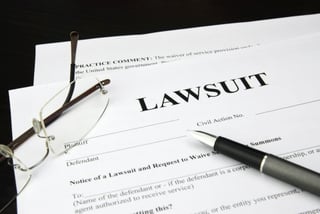Scura, Wigfield, Heyer, Stevens & Cammarota Blog
- Blog
Implications of a Pending Potential NJ Lawsuit on a Bankruptcy Case
 Are you wondering what effect a bankruptcy proceeding will have on your pending or potential lawsuit? This blog will explore how a bankruptcy proceeding will affect your claim against another individual or entity.
Are you wondering what effect a bankruptcy proceeding will have on your pending or potential lawsuit? This blog will explore how a bankruptcy proceeding will affect your claim against another individual or entity.
The Lawsuit is an Asset of Your Bankruptcy Estate
To initiate a bankruptcy case, you must file a petition with the court. This is essentially a full financial disclosure. Schedule B of that petition discloses all of your personal property. Under the law, any pending or potential lawsuit where you have a cause of action against another individual or entity is an asset of your bankruptcy case that must be disclosed. Failure to list an asset that you are aware of constitutes bankruptcy fraud. The key question is whether the action forming the basis of the lawsuit occurred prior to the bankruptcy filing or after the bankruptcy filing. If the action occurred before you filed for bankruptcy, then it is an asset of your bankruptcy case.
In real life terms, let’s suppose that you were involved in a car accident. If the accident occurred prior to the bankruptcy filing, then any cause of action you may have stemming from the car accident is an asset of your bankruptcy estate. It does not matter if the injury was not diagnosed prior to the bankruptcy filing or if you were not aware that you had a claim against the other driver at the time of the bankruptcy filing.
The Implications of a Lawsuit Being an Asset of Your Bankruptcy Case
In any bankruptcy case, an individual is permitted to exempt certain assets under Section 522 of the Bankruptcy Code. For a personal injury action, you can exempt an amount “not to exceed $23,675 on account of personal bodily injury, not including pain and suffering or compensation for actual pecuniary loss, of the debtor or an individual of whom the debtor is a dependent.” Further, you can use your wildcard exemption towards the value of the lawsuit. The wildcard exemption permits you to exempt $1,250 plus up to $11,850 of what is unused from the permitted residential real property exemption. While this may sound very vague and confusing, an attorney should have what can be exempted and how it will be listed on the petition prepared for you prior to your bankruptcy filing. Thus, you should know exactly what is exempt and non-exempt prior to entering the bankruptcy process.
In a chapter 7 bankruptcy, the non-exempt portion of any litigation is subject to a trustee’s collection. Under the bankruptcy code, a chapter 7 trustee takes possession of the litigation upon the bankruptcy filing and will have the ultimate decision making authority. A trustee may give up that right through an abandonment of assets if he or she does not believe there will be assets above the exemptions for collection towards repayment of creditors. However, until that happens you will lose control of the litigation. Chapter 13 and chapter 11 bankruptcy operate a bit differently in that you retain control of the litigation, but you will need to pay, at minimum, the non-exempt value of the claim during the course of a reorganization plan.
If you are considering filing for bankruptcy, it is important to contact an experienced New Jersey bankruptcy attorney to guide you through your options and present you with the potential pitfalls. For questions regarding a potential bankruptcy, call the law firm of Scura, Wigfield, Heyer, Stevens & Cammarota, LLP for a free consultation.
Whether you need to completely eliminate your debt through Chapter 7 bankruptcy, or need to reorganize your credit payments through Chapter 13 or Chapter 11, we are well qualified as a full-service bankruptcy law firm for people in these and other New Jersey counties: Passaic County, Hudson County, Essex County, Bergen County, Morris County, and Sussex County. Call us today at 973-786-1582.

David E. Sklar
Prior to joining Scura, Wigfield, Heyer, Stevens & Cammarota, LLP, David Sklar graduated from Rutgers University-Newark School of Law with a J.D., Cum Laude. Mr. Sklar was the recipient of a Pro Bono Award and was honored by the New Jersey Bar Association for his commitment to the Street Law Program by being awarded the Street Law Prize.
Share Article
Need Help? Contact Us Today!





Lists by Topic
- Bankruptcy (320)
- Personal Injury (95)
- Chapter 13 (52)
- Chapter 7 (50)
- Debt Management (50)
- Foreclosure (47)
- Accident (32)
- Car Accident (26)
- Chapter 11 (24)
- Business Bankruptcy (19)
- Credit (18)
- Insurance Claims (17)
- Business Law (12)
- Litigation (12)
- Employment Law (11)
- Probate and Estate Law (11)
- Damages (10)
- Medical (10)
- Product Liability (10)
- Workers Compensation (10)
- Attorney (9)
- Consumer Bankruptcy (9)
- Commercial & Residential Real Estate (6)
- Slip and Fall (6)
- Contracts (5)
- Premises Liability (5)
- Repossession (5)
- wrongful death (5)
- Video | Bankruptcy (4)
- Bankruptcy Cost (3)
- Corporate Litigation (3)
- Trial Law (2)
- student loans (2)
- tax (2)
- Attorney Fees (1)
- COVID-19 (1)
- Certified Civil Trial (1)
- Dog Bites (1)
- News (1)
- Relocation Assistance (1)

